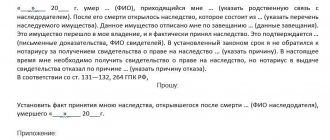Inheritance by right of representation Who inherits by right of representation The order of inheritance by right of representation Can grandchildren claim the inheritance of a grandmother with living parents Who cannot inherit by right of representation
Very often we receive questions regarding, in particular, the order of inheritance by the grandchildren of the testator, such as:
- What line of succession do the grandchildren belong to?
- Can a grandson claim an inheritance?
- Can grandchildren claim their grandmother's inheritance while their parents are alive?
- Can a grandson claim his grandmother's inheritance if the children refused?
- Can a grandson claim his grandmother's inheritance while his father is alive?
- To whom does the inheritance pass in the event of the death of the heir?
- Can a grandson claim his grandmother's inheritance?
- Do grandchildren inherit if there are children?
- Do grandchildren have the right to inheritance, or does the entire inheritance go only to the children of the testator?
- Can a grandson claim his grandmother’s inheritance if his mother is alive and does not accept the inheritance?
- How can grandchildren inherit an inheritance while their parents are alive?
Lawyer on inheritance issues in St. Petersburg. Tel.+7 (812) 989-47-47 Telephone consultation
Inheritance by right of representation
In this article we will talk about how the inheritance of the testator’s property is carried out in the case when the heir by law dies before the testator himself, or they die on the same day, to whom his right of inheritance is transferred, whether grandchildren can claim the inheritance, what is the procedure for their inheritance .
For such cases, the law provides for special rules of inheritance, according to which the descendants of deceased heirs are called upon to inherit. This is inheritance by right of representation .
The right of representation is a type of inheritance by law (Article 1146 of the Civil Code of the Russian Federation), when the legal share of an heir who died before the death of the testator or simultaneously with him is inherited by his children. In other words, the children of a deceased heir take his place and inherit not according to their own right, but according to the right of their parent, whose place they take, and only within the framework of that share of the inheritance that would be due to him by law if he were alive.
Mechanism
We will consider further how the transfer of inheritance occurs.
Sample statement of claim
If the successor by the right of representation or transmission did not have time to declare his rights to the inheritance in time and, at the same time, the reason for the omission is considered valid, he can file a corresponding statement of claim in court and restore the lost right ( Article 1155 of the Civil Code of the Russian Federation ).
An example of a document can be viewed here.
The sample statement of claim is no different from the one filed by a general heir when the period of entry into inheritance rights is missed and must contain:
- name of the judicial authority;
- information about the plaintiff (heir by nomination);
- the name of the application is “On restoring the period for accepting an inheritance”;
- description of the reason for missing the legal deadline;
- reference to the rules of law supporting valid circumstances for missing a deadline ( Article 1155 of the Civil Code of the Russian Federation );
- list of application documents;
- date, signature of the plaintiff.
The claims will be satisfied only if the court considers the reasons for missing the inheritance deadlines worthy of attention (respectful) ( paragraph 3, paragraph 2, article 1156, article 1155 of the Civil Code of the Russian Federation ). At the same time, the heir, upon presentation, must provide, among the application documents, a written, reasoned notarial refusal of inheritance powers.
Additionally
According to the letter of the law, a person called to inherit according to transmission must declare his powers within six months from the date of death of the will-maker.
However, if after the death of the main candidate for inheritance there are less than 3 months , the remaining period can be extended by another 3 months .
In fact, in exceptional cases, the maximum period for entering into inheritance rights may be no more than 9 months ( paragraph 2, paragraph 2, article 1156 of the Civil Code of the Russian Federation ).
Who inherits by right of representation
Inheritance by right of representation is possible only as part of the first three stages of inheritance by law.
The law defines an exhaustive list of persons who may be heirs by right of representation, and these are:
- The heirs of the first priority by right of representation are the testator’s natural grandchildren, as well as their descendants (clause 2 of Article 1142 of the Civil Code of the Russian Federation).
- The heirs of the second priority by right of representation are the testator’s nephews and nieces , i.e. children of both full and half (half) brothers and sisters of the testator (clause 2 of Article 1143 of the Civil Code of the Russian Federation).
- Heirs of the third priority by right of representation are cousins of the testator , i.e. children of both full and half brothers and sisters of the testator’s parents (clause 2 of Article 1144 of the Civil Code of the Russian Federation).
Thus, persons inheriting by right of representation occupy among other heirs of the called line the place that their deceased parent could have occupied if he had been alive on the day the inheritance was opened.
Help from experienced inheritance lawyers. Tel.+7 Telephone consultation
Decor
Inheritance rights are entered into in two ways - upon application from a notary and in the form of actual acceptance (Article 1152 of the Civil Code of the Russian Federation).
In the first case, the standard procedure applies. Within six months after the opening of the inheritance, an application is filled out at the notary's office. In the absence of inheritance disputes, at the end of six months, a certificate is taken, on the basis of which the property is re-registered.
When actually joining, the procedure is slightly different. The potential heir actually takes over the testator's property. For example, he lives in the apartment (house) of the deceased, bears the associated material costs to pay for the housing, and takes measures to preserve it.
Documentary confirmation of these actions serves as the basis for further recognition in court as an heir. Upon receipt of a court decision, the notary issues a certificate, and the successor legally acquires rights to the property.
The order of inheritance by right of representation
So, inheritance by right of representation is possible only in cases:
- When the legal heir died before the death of the testator
- When the heir by law died at the same time as the testator (within one day)
For example, if the father died before the grandfather, or both of them died on the same day, then the grandson will inherit the grandfather's property by right of representation, and only that share of the inheritance that his father could have inherited if he had not died. The same rule applies when it comes to the testator’s nephews and cousins, that is, the condition for their inheritance by right of representation will be the death of their parents before the testator, or at the same time as him.
In the event that there are several heirs by right of representation , they divide among themselves an equal share of the inheritance that would be due by law to their deceased parent. This is one of the basic rules of inheritance by right of representation.
Here's an example:
If the testator has three children, one of whom died before him, then the children of the deceased heir will be called to inherit by right of representation, but not on an equal basis with the other two heirs of the first priority, but will divide among themselves one share of the inheritance, which could go to their deceased parent , may he be alive. That is, the inheritance will be divided into three equal parts, one of which will be transferred by right of representation to the grandchildren of the testator and distributed among them in equal shares, and the remaining two parts, according to the general rules, will be inherited by the testator’s two children.
It is also necessary to remember that heirs by right of representation are liable within the inherited property only for the obligations (debts) of the testator himself, but not for the obligations of their parent, whom they represent.
Document submission process
Documents are submitted to the notary office located at the place of residence of the deceased. It is important to submit documents within the period established by law, that is, 6 months from the date of opening the inheritance case. In this case, it is possible to apply to both public and private offices.
The applicant provides the following package of documents confirming the fact of relationship and the right to receive property:
- death certificate of the testator;
- a document confirming the birth of the heir who would have taken possession if he had been alive;
- passport;
- title documents for real estate and other objects (things) that a citizen wishes to receive into his ownership;
- a certificate from the housing office or management company at the place of residence of the deceased;
- extract from the register of ownership of real estate;
- heir identification code.
In some cases, the notary does not accept the submitted documents. The revealed fact of falsification of documents, the notary’s doubts about the relevance of the right of representation, the need to provide additional supporting documents are the main reasons that give the notary the right not to accept the application.
If the notary refuses to accept the documents, the applicant files a claim in court to appeal the disagreement. But to do this, you need to receive a written document from the official.
Can grandchildren claim their grandmother's inheritance while their parents are alive?
The law determines that the grandchildren of the testator , as well as his nephews and cousins, are not direct heirs by law, that is, they cannot inherit on their own. This means that the grandson cannot independently claim the grandmother’s inheritance on the same basis as his mother.
Although grandchildren are included in the first line of inheritance, the law allows them to inherit only by right of representation , the main condition of which is the death of the direct heir by law, i.e. their parent, before or simultaneously with the testator.
Only then can the descendants of this heir claim the inheritance by right of representation.
A noteworthy feature of the law is that grandchildren, as well as nephews and cousins of the testator, cannot inherit after the deceased testator, even if their parents did not accept the inheritance after the death of the testator. The fact is that their right of inheritance is derived from the right of inheritance by their parents, i.e. if the children of the testator, being alive on the day of opening of the inheritance, did not accept the inheritance, then the grandchildren do not have the right to this property.
In this case, the inheritance will pass to other heirs according to the general rules of inheritance by law.
Let's take an example:
After the death of the testator, there were three legal heirs, two daughters and one son. The testator’s daughters declared their rights to the inheritance by promptly contacting a notary, but the son did not apply to the notary to formalize his inheritance rights within the 6-month period established by law, and also did not take actions indicating the actual acceptance of the inheritance, that is, he does not lay claim to his father’s inheritance . In this case, the children of such an heir cannot claim the inheritance of their grandfather, despite the fact that they are his natural grandchildren. The entire inheritance will be distributed between the testator's two daughters. And if the testator had no daughters, that is, there would only be a son who did not accept the inheritance, then the right of inheritance would pass to the second-order heirs, but not to the grandchildren.
Inheritance lawyer in St. Petersburg. Tel.+7 Telephone consultation
Moreover, the son of the testator cannot even refuse the inheritance in favor of his children, since his children are not independently among the heirs of the first priority, but can inherit only by right of representation of their parent, the condition of which is his death, and the deceased heir cannot refuse from inheritance.
At the same time, Article 1158 of the Civil Code of the Russian Federation allows other heirs by law to refuse the inheritance in favor of the heirs by right of representation, that is, in the event of the death of one of the heirs by law, the remaining heirs have the right to refuse their share of the inheritance in favor of the children of the deceased heir, who inherit by right the right to represent your parent. Consequently, in this case, the children of the deceased heir will inherit his share of the inheritance by right of representation, and the share of the heir who refused the inheritance in their favor.
Thus, a grandson can inherit the property of a grandmother or grandfather while a living parent only if there is a will in his favor .
Is there a limit
The main limitation in the exercise of the right to inheritance through representation or transmission is (clause 1 of Article 1117 of the Civil Code of the Russian Federation):
- the main heir renounced the inheritance (refusal is allowed only in written notarial form);
- the direct candidate missed the deadline allotted for entering into inheritance rights;
- the main heir was deprived of the right to inheritance according to the will of the testator;
- the direct candidate is recognized as an unworthy heir.
A person may be recognized as an unworthy heir if one of the following points is proven (Article 1117 of the Civil Code of the Russian Federation):
- use of illegal actions against the testator;
- the use of illegal actions against any of the heirs;
- evasion of parental rights;
- violation of duties provided for performance in relation to relatives (failure to provide assistance to close relatives in need).
Cancellation of rights - legal grounds
To cancel the right of representation, it is necessary to apply to the court indicating a compelling reason that makes it impossible for the given person to receive the inheritance.
Only those persons whose property status has been infringed have the right to file a claim (a neighbor or caring friend of the testator will not be able to file a claim).
The law provides three key ways to invalidate the right of representation:
- Focus on the limitations of the will as specified by the testator.
- Recognize the heir as unworthy: if he committed a crime in order to take possession of the property of the deceased.
- Exclude property from the inheritance mass (for example, recognize it as jointly acquired by the spouses).








